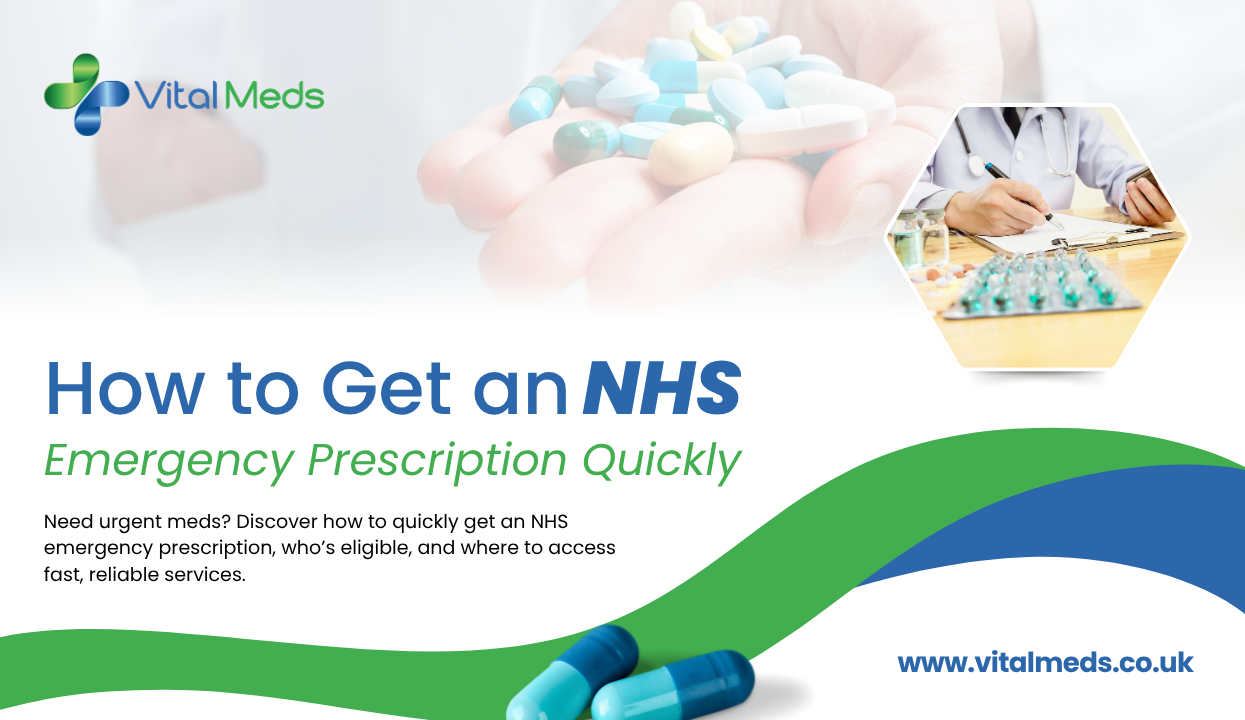- Your cart is empty
- Continue Shopping
How to Get an NHS Emergency Prescription Quickly

Medical emergencies can occur when we least expect them. Running out of vital medication especially over a weekend or public holiday quickly turns a minor inconvenience into a stressful situation. The NHS emergency prescription service is designed to take the pressure off. Whether you forgot to order a refill, lost your supply while on the move, or had another unexpected setback, NHS staff will work with you to supply urgent medicines in a safe, timely manner.
we explain how to secure an emergency prescription, identify who qualifies, outline each step you must follow, and direct you to the right people and places for help.
What Is an NHS Emergency Prescription?
An NHS emergency prescription offers a short-term supply of essential drugs dispensed to a patient without the usual visit to a GP or printed script. Clinics, pharmacies, and NHS urgent-care staff issue these tokens when people cannot follow the standard ordering route yet still need their medicine right away.
This service helps ensure continuity of treatment for patients managing chronic conditions, such as asthma, diabetes, or high blood pressure.
When Do You Need an Emergency Prescription?
You may need an emergency prescription if:
- To qualify under this scheme you must
- Have used the medication before.
- Be able to state the exact dose and how long you took it.
- Have a clear, urgent reason for the drug (controlled substances or antibiotics are granted only when absolutely required).
Who Is Eligible for an Emergency NHS Prescription?
Generally, anyone who has previously been prescribed the medication and is in genuine urgent need may be eligible. The pharmacist or healthcare professional will assess the situation and decide whether to issue a short-term supply.
You must:
- Have taken medication before.
- Be able to confirm the dose and treatment history.
- Have a legitimate medical need (not for controlled drugs or antibiotics unless essential).
How to Get an Emergency Prescription Through the NHS
1. Contact Your Local Pharmacy
Most community pharmacies across the UK offer an emergency supply service. If the pharmacy has dispensed the item in the past, they can often provide a limited quantity without waiting for a doctor’s note.
Be ready with
- your NHS number, if you can find it
- information about the regular prescription
- photo ID, which some locations ask for.
2. Visit an NHS Walk-In Centre or Urgent Treatment Centre
If no pharmacy is open or nearby, a walk-in centre or urgent treatment unit could step in. Staff there can write a short prescription themselves or direct you to a GP who will authorize the medicine you need.
NHS Emergency Prescription Costs
Is It Free?
- In England, standard NHS prescription charges apply (£9.90 in 2025).
- In Scotland, Wales, and Northern Ireland prescriptions are normally free.
- If you meet criteria for free prescriptions-low income, specific health conditions, or age-may still pay.
Always carry exemption certificates if they apply.
Can You Get an Emergency Prescription Without Seeing a Doctor?
Yes, many pharmacies can provide emergency medicine without a written script, as long as they deem it safe. The final call rests with the pharmacist, who may refer you to a GP if unsure. Some drugs-strong painkillers or certain antibiotics-still need approval from a GP or hospital.
Using Online Pharmacies for Emergency Prescriptions
A number of NHS-approved online pharmacies now offer emergency scripts.
Here is how the process usually works:
- Complete a brief medical questionnaire online.
- Upload ID and any previous prescriptions.
- Wait for a prescriber to review and approve.
- Medicine ships the same day or next day.
Most services charge a consultation fee, and some drugs may cost more than at a local pharmacy.
Benefits:
- Very convenient, especially when you are travelling away from home.
- Offers a quick turnaround, so you can often have the medicine within hours.
- Provides access even outside your GP’s normal hours, including evenings and weekends.
Downsides:
- It is not suitable for every type of medication, particularly those requiring special storage or monitoring.
- Depending on the service, you may still need to pay a small fee on top of the prescription charge.
Private vs NHS Emergency Prescription Services
When NHS options are fully booked or out of hours, private services sometimes become your only lifeline. Common private routes include:
- Private online pharmacies that promise fast delivery.
- Private GP appointments, either in person or through a video call.
Key Differences:
| Criteria | NHS Service | Private Service |
| Cost | Free or NHS charge | Varies – can be expensive |
| Speed | Fast, especially via NHS 111 | Often same-day delivery |
| Availability | During NHS hours/weekends via 111 | 24/7 availability (in many cases) |
Choose a route based on how urgent your need is, where you are located, and what you can afford.
How to Avoid Needing an Emergency Prescription
Emergency options are handy, but forward planning keeps stress levels low.
- Set a phone reminder a week before each medicine is due to run out.
- Download the NHS App or similar tools that track repeat prescriptions.
- Inspect your supply every Sunday evening to catch low stock early.
- When travelling, pack two extra doses in your hand luggage, not the checked bag.
- Ask your GP about the repeat-dispensing scheme to reduce last-minute trips.
What Medicines Can Be Issued in an Emergency?
Pharmacists in England can temporarily supply a surprising number of essential medicines when a formal prescription is missing. The list includes:
- Asthma inhalers
- Insulin, provided staff can confirm the patient’s usual dose
- Routine blood-pressure tablets
- Most heart medications
- Anti-epileptic drugs
- Thyroid hormone tablets
But they cannot supply:
- controlled drugs, such as morphine or codeine
- Most antibiotics, unless the pharmacist judges that treatment is urgently needed and approves it.
Because stock-and clinic hours vary widely, it is wise to call ahead and confirm that your specific medicine is available before travelling.
Get the Urgent Medication You Need
When a critical treatment runs out, the NHS emergency prescription service can feel reassuring. Assistance comes through local pharmacies, NHS 111, or an urgent care centre, so help is rarely far away. By knowing the options and acting swiftly, patients can close any sudden gap in their therapy and protect their wellbeing.
For faster, out-of-hours access, private pharmacies and courier services fill the gap, though the cost is usually higher. Planning a little in advance-lifting reserves and keeping the number of the nearest pharmacy handy-can help ensure that real emergencies never materialise.
Need quick access to NHS-approved medicine?
Use VitalMeds today-and stay one step ahead of any health emergency.
Frequently Asked Questions
An NHS emergency prescription is a short supply of essential medicine that a community pharmacist can provide when no formal script is available. It bridges the gap until the patient can see their GP. To grant the request, pharmacy teams check the patient’s medication history and judge whether the refill is safe to issue.
Yes, if you call NHS 111, staff can direct you to a pharmacy or urgent-care centre open around the clock. They will tell you where to go and how soon you can get help. Carrying your ID and a list of current medicines speeds things up.
In England you pay the regular NHS fee unless you meet an exemption rule. In Scotland, Wales, and Northern Ireland prescriptions are free regardless of status. Always bring documents that prove you are exempt.
Yes, A community pharmacist may give you needed medicine if they judge the situation urgent. The drug must be one the pharmacy has dispensed before, and it cannot be a controlled substance. Be ready to show ID and basic details about your usual dosage.
Most pharmacies will provide enough medicine for two to five days. That should keep you stable until you can reach your own GP. The exact amount depends on the pharmacist’s assessment and the specific drug involved.

